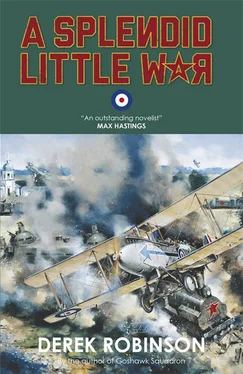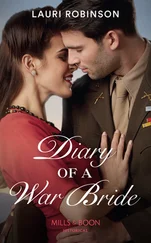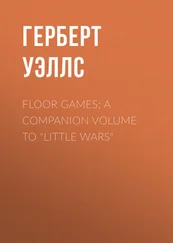“Lower stomach?”
“Groin. I examine him, he lets out a long groan. He hasn’t got a hernia, but he’s proud of his pathetic manhood.”
“Let me guess. Abnormal.”
“Who cares? Size is an accident of birth. In France, in Forward Casualty Clearing, I saw a hundred naked men a day. Some wanted me to hold their hand, usually the ones who were dying, but nobody ever asked me to measure their genitalia, which was just as well because sometimes there was nothing left to measure.”
That silenced him. They had crossed the field and now he was driving carefully between Scots pines. “Where are we going?” she said.
“Anywhere. I too get tired of the company of men. Especially Englishmen.”
“What’s wrong with them? Apart from phantom hernias.”
“They thought they came to save Russia. Actually they came for the fun of flying aeroplanes at someone else’s expense. Now it’s not such fun and they’re turning sour. Russia’s fault, of course.”
“You sound a little sour yourself.”
He stopped the car beside a huge cypress. It had split down the middle and some branches almost touched the ground. “Do you like climbing trees?”
“Did once.”
“I climbed them with the Tsar. He enjoyed playing hide-and-seek, and he was happiest hiding up a tree. Come on.”
The branches were thick and horizontal and easy to climb. Squirrels fled and poked their heads out to watch the invaders. The doctor and the count found a comfortable perch thirty feet up. “This was a good idea,” she said. “I feel deliciously free. What did you and the Tsar talk about when you were hiding?”
“He told jokes. He wasn’t the Tsar then, only the heir. Nobody laughed in the Imperial court. Too stuffy. I was just a boy, he made me laugh.”
“What sort of jokes?”
“Oh… silly riddles.” He thought. “What do you get when you cross a crocodile with a parrot?”
“Give up.”
“A big surprise when it bites your leg off and says, ‘Who’s a pretty boy, then?’ He found that hilarious. Sometimes he laughed so much that I had to finish telling the joke. Then he’d laugh even more.”
“He sounds like a cheerful chap.”
“He was cheerful when he was hiding. The rotten thing is he couldn’t hide forever, could he?”
“Nobody can. We all have to grow up.” She stroked his jaw. “You know, you’re not bad-looking, for a decadent bastard aristocrat. Have you another name? Apart from…”
“Pierre Alexander Porphyrevich. The last two are after my father. He was also a brilliant chemist. He taught at the St Petersburg School of Medicine for Women. Music and chemistry. Both a complete mystery to me.”
“You have an open mind, Pierre Alexander Thingummy, even if it is absolutely empty.”
“We should be getting back,” he said. “Susan Perry.” They climbed down.
*
Lacey welcomed the challenge.
His big problem was the absence of coffins and graves. A service needed a focus, a visible memorial. He talked to a flight sergeant and they sketched a wooden plaque, nailed to an upright. “Make it a bit wider,” the flight sergeant said, “and it looks sort of like a cross.”
“Excellent.” Lacey gave him the inscription.
He went to his Pullman, shut his eyes and put himself in the C.O.’s shoes. Then he wrote the eulogy. It took ten minutes: Lacey was fluent under pressure. That left him time to concentrate on the tricky bit, his own poetic contribution. The squadron expected verbal fireworks, and he’d exhausted Rupert Brooke. Lacey reached for his small library of British verse and got down to some serious larceny.
With half an hour to go, the flight sergeant brought him an armourer with a bugle. “The Marines left it behind, sir,” he said. “Miller here says he used to be in a Salvation Army band.” Lacey auditioned him on the spot. “Good enough,” he said. “You’ll close the show. After the rifles.” He inspected the plaque for spelling mistakes and found none, checked the depth of the hole dug by the plennys in the field, and told Wragge the order of battle.
At twelve noon the hollow square had formed. The flight sergeant held the post in its hole, not touching the plaque where the paint was still tacky. Brazier handed Wragge a spade and he shovelled some earth into the hole and gave the spade to an aircrew member who did his bit and passed it on until all the officers had helped erect the sign. Oliphant was last. He tramped the soil down firmly and stood back.
Wragge read aloud the inscription: In Memoriam, Thomas Hopton and Michael Blythe, Merlin Squadron, Royal Air Force, and the date. It was a calm morning, soft sunshine, good haymaking weather back in England. He spoke the lines Lacey had written, about how often in war the phrase Lost in action was used but never more tragically, and splendidly, than in this case. He said that Hopton and Blythe had died fighting and that they had known exactly what they were doing at the end, and it was an ending of great courage. He talked of their pluck and devotion to duty and huge strength of character. “Let this memorial, and this raw earth, be their burial ground,” he said.
Lacey allowed a long pause for the words to fade, and stepped forward and did his best to improve the tone of the occasion.
In our hearts believing
Victory crowns the just,
And that braggarts must
Surely bite the dust.
So bear the brunt and pay glad life’s arrears
Of pain, darkness and fears,
For sudden the worst turns the best to the brave,
The blackest minute lies in its grave.
Happy is England in the brave that die
For wrongs not hers and rights that loudly cry;
Happy in those that give, give and endure
The pain that never the new years may cure.
Nor law, nor duty bade them fight,
Nor public men, nor cheering crowds.
A lonely impulse of delight
Drove to this tumult in the clouds.
He took a pace back. Three rifle volleys echoed back from the trees. The bugler sounded the “Last Post”. He cracked a couple of notes but nobody remembered that when he held the last, saddest note so sweetly that even Brazier gave a slight nod of approval. That was as good as a standing ovation. Lacey almost smiled.
3
The Camel Flight was getting smaller, so a few bomber crews had been invited to join The Dregs: Tusker Oliphant, Douglas Gunning, Prod Pedlow, Joe Duncan. They were expected to contribute to the conversation. At lunch, after the ceremony, Gunning broke the silence. “Ah, soup,” he said. “I like a drop of soup.”
Nobody added to that.
“Summer’s going fast,” Oliphant said.
“Not in Australia,” Jessop said. “Summer hasn’t begun there.”
“How did you get in the Corps, Junk?” Pedlow asked. “Who did you bribe? I ask because my mentally defective cousin wants a commission.”
“Is he any good at ground-strafing?” Dextry said. “He can have mine.”
“It’s true, about Australia,” Joe Duncan said. “They count backwards, they stand on their heads, and they have very hairy feet. To keep the sun off.”
“How did you get a commission?” Jessop said. “Find it in a Christmas cracker?”
“The thing about summer,” the C.O. said, “it’s getting to the end of the county cricket season, and cricket, I think you’ll agree, is what made Britain great. Any cricket news on your magic box, Lacey?”
“Alas, no.”
“Cricket. Is that the game they play with racquets?” Dextry said.
“You’re thinking of the University Boat Race,” Gunning said. “Who won that, Lacey?”
“Oxford. Or perhaps Cambridge. There was some dispute.”
“I joined a boat club once,” Jessop said, “but it fell apart when we put it in the water.”
Читать дальше











